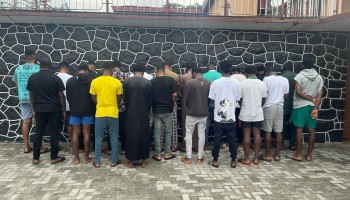The group then used these campaigns to disseminate 26 malware programmes, spyware and remote access tools, including AgentTesla, Loki, Azorult, Spartan and the nanocore and Remcos Remote Access Trojans, the Interpol statement said.
The programs would then initiate scams to siphon off data or funds from tens of thousands of victims.
“The prolific gang is believed to have compromised government and private sector companies in more than 150 countries since 2017,” Interpol said.
Though little is still known about the wider organization the three men were involved in, Group-IB believes that it has a hierarchical structure with multiple cells or divisions and that it has already amassed some 50,000 victims around the world.
“This group was running a well-established criminal business model. From infiltration to cashing in, they used a multitude of tools and techniques to generate maximum profits,” said Craig Jones, Interpol’s cybercrime director.
The arrests were the result of a year-long joint investigation dubbed “Operation Falcon.”
Though it is not the world’s worst offender, high unemployment along with lax law enforcement and police engagement online has allowed Nigeria to earn a reputation as one of the world’s Meccas for cybercriminals.






